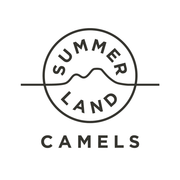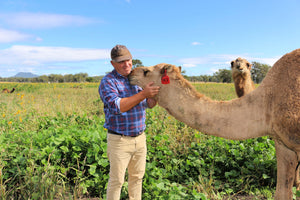Regenerative Agriculture with Camels
Here at Summer Land Camels, we are well-known for our award-winning Camel Dairy and Skincare products but many people aren’t aware of the extent that Paul and our team go to in order to create products of such high quality. Most people would assume that healthy camels produce healthy products but did you know that healthy soils produce healthy camels?
Sustainable products from the ground up.
Regenerative Agriculture is more than a catch-phrase, it’s an ethos that guides practices and decision making here on the farm. It's about protecting the landscape and adding value to the soil - protecting it from erosion, improving it in order to leave it in better condition than we inherited it. They are important strategies to protect the landscape and ensure the health of our animals.
Paul Martin, CEO of Summer Land Camels, has decades of experience using regenerative, biodynamic and holistic farming techniques. This is definitely a subject that gets him excited!
This year has had significant challenges when it comes to the weather. It has been very wet and we have had significant flooding here at our farm near Harrisville, Qld. Regenerative Agriculture is a way to limit our risk to these adverse events.
Watch this video of Paul explaining his approach to sustainable farming:
Risk Mitigation through Mixed Species Cropping
In February, we planted a paddock with a range of species, designed to add health to the soil and protect the land. We planted a combination of millet, sunflowers, sun hemp, cow pea, legumes and dolichos lab lab.

This was done with the intention to harvest and bale it up to use as camel feed, or to turn it back into the soil. Due to the extreme wet weather, it wasn’t able to be harvested so instead, we let the camels in to feast on it.

Had we followed traditional farming techniques, we would have left this paddock to rest or fallow, and the bare ground would have been exposed to the elements. This year, that would have meant losing the topsoil down the creek, as this paddock experienced flooding. Instead, the crops did their job and protected the land.
Another goal of mixed species cropping is to use crops with different root depths in order to stimulate fungi and microflora and in soil, which live at varying depths of the soil profile.

Plants with deeper roots such as sunflower, sun hemp, cowpea and lab lab all draw nutrients from deeper in the soil layers. Millet lives off the top 4 inches. On our farm, the soil binds very tightly together when inundated with water, so this year the sunflowers didn’t penetrate as deeply as they normally would, but they still did the job of protecting the soil from flooding.
Plants with deeper roots also give greater stability to the soil, protecting it from erosion during extreme wet weather that we have been having.
Chemical free
By making use of certain “cover crops” such as legumes, we are able to naturally add nitrogen to the soil, eliminating the need for artificial fertilizer.
Once the camels finished grazing on the crops, it was “turned in”. Turning in the crop involves ploughing it back into the soil to create “green manure”. This sparks up the microbes in the soil, adding some nice humus to the soil profile. In addition to this, grazing the camels means that their manure, full of microbes and good bacteria also act as a natural fertilizer and feed the fungal bacteria present in the soil.

Camels’ role in sustainable agriculture
Camels can play an important role in biodiversity and helping to protect our land. Our camels were originally sourced from the Australian outback and have been gently domesticated and in addition to our dairy herd and tourism camels, we have approximately 500 camels that graze on our 800 acre property. We use a system of rotational grazing and as a result of this technique and the biodiversity of Camel manure, we have seen an increase in grass density.
We have recently added a herd of cattle to the property to increase the biodiversity even further. Biodiverse herds lead to biodiverse nutrients for the soil.
Gut health is the key
One of the unique things about Camels is the biodiversity in gut biome. Biome, or microbiome, refers to the trillions of bacteria, viruses, fungi and other microorganisms that live in the gut and on the skin and are essential for life and health for us all.
Multi-species cropping gives camels a lot of variety which is really important for their gut health. Camels love variety in their diet. They go out of their way to eat a lot of different things and they love browsing on trees as well. This gut biodiversity can also benefit other livestock. When cattle drink from the same water trough, they pick up the gut biome from the camel which allows them to better digest lignified (dried and dead looking) grass, which means that they can maintain a good weight in times of drought.
Soil health is all about biodiversity of microbes, bacteria, fungus and nutrients and this creates good quality feed for the camels. Camel health relies on a variety of feed which fosters their gut biome – the biodiverse mix of microbes and bacteria that is unique to camels. Camel milk is known to be a prebiotic and probiotic, excellent for gut health. Camel milk is also a superfood for the skin, feeding the skin microbiome which is essential for skin wellness.
Are these things all connected? YES!
The health of our camels is of utmost importance because healthy camels produce the highest quality milk, which enables us to produce products that help people with their individual health journey.
Where Can I Buy Camel Milk and Camel Milk Products?
Fresh Milk - Our award-winning Camel Milk is a great dairy alternative, and contains no beta-casein A1. It is rich in vitamins, minerals, healing immune proteins and its silky, smooth and clean texture makes it the best tasting milk for every occasion. You can buy fresh Camel Milk from our farm near Harrisville Qld or from a range of stockists in Southeast Queensland. For bulk orders, please place an order with us prior to your visit. Home delivery is also available to selected postcodes in Brisbane, Gold Coast and Sunshine Coast.

Powdered Milk –
Our fresh Camel Milk is freeze dried to lock in the pure goodness. Add some Camel Power to your day! A perfect addition to milkshakes, smoothies, or for adding to cooking. Available in 100g and 200g sealed packs.
- Pure Australian Camel Milk
- 100% Natural
- No additives or preservatives
- Rich source of vitamins and minerals
- Halal Certified
Available from our farm or shop online.

Camel Milk Skincare –
Our Camel Milk Skincare has been blended with a carefully selected range of all-natural ingredients that research has shown to be beneficial for your skin.
Whether you need to treat a skin condition like eczema, psoriasis, dermatitis, acne, or to maintain healthy skin, our skincare range can help repair, protect and restore it. Our products can be used daily for natural skin nutrition and support, and are suitable for all skin types and conditions.
All our products are natural and contain no PARABENS, PETROCHEMICALS, SLS, SULPHATES, SYNTHETIC FRAGRANCES.
Available from our farm or shop online

Camel Milk & Honey Vodka–
A World First - Unseen before in the world of spirits, discover a ground-breaking vodka with a wild backstory.
Each batch consists of just 300 bottles, and is carefully crafted and triple distilled from camel milk whey from our pristine farm in Queensland’s Scenic Rim. Imparting a smooth and delicate character, this treasured whey gives our vodka its award-winning taste and prevents food waste at the same time.
Available from our farm or shop online




